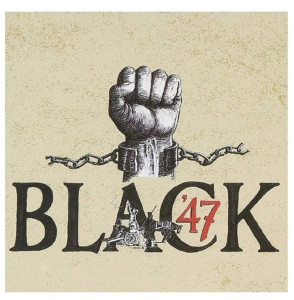 Time magazine said of Black 47: “Finally. Rock ‘n’ roll that means something again!” Bullocks, I say. If Black 47 was just a rock ‘n’ roll band, I wouldn’t be doing a comprehensive review of their albums. Black 47 is an Irish-American band that combines trad material, themes both personal and political, and throws in a rock ‘n’ roll style energy — the result being totally unique.
Time magazine said of Black 47: “Finally. Rock ‘n’ roll that means something again!” Bullocks, I say. If Black 47 was just a rock ‘n’ roll band, I wouldn’t be doing a comprehensive review of their albums. Black 47 is an Irish-American band that combines trad material, themes both personal and political, and throws in a rock ‘n’ roll style energy — the result being totally unique.
Larry Kirwin claimed on the Black 47 Web site that the band was born when … “On St. Patrick’s Day, 1985, I chucked in rock and roll forever. I returned to the theater and, for the next four years, wrote, and directed or produced five plays (published under the title Mad Angels). In the summer of 1989, while on a tour of Eastern Europe with the poet Copernicus, we played an unauthorized concert in Prague for Havel’s dissidents. Over 12,000 people showed up to defy the authorities. It was a small victory but it made me realize that rock music could still effect social and political change. Back in New York, I walked into Paddy Reilly’s, a dilapidated saloon. Chris Byrne was playing uilleann pipes with a local folk group, Beyond the Pale. I sat in for a few numbers and afterwards we got to talking about the lack of content in contemporary music. He told me he was a cop and loved The Clash and rap music. I have no idea what I said to him but six hours and some gallons later, we formed Black ’47.”
Now it may well be that Larry Kirwan is full of shite as regards how Black 47 was formed, but he did create something truly unique: a band that mines both the personal and political spheres of Irish and Irish-American culture in a way that truly excites its fans. And not unexpectedly was difficult for record companies to understand!
And she said “Don’t you ever leave me, oh for god’s sake don’t let me down
But how could I ever take a black girl back to Wexford town
Just then the streets of fire turned to blood, a yellow cadillac cruised by
And as I raced up 42nd Street, the Ice Man shouted
“Hey Paddy, it’s time to die”“Banks of the Hudson”
Black ’47 (yes, there was an apostrophe in their name for one album) established the lineup that would more or less form the core of the group 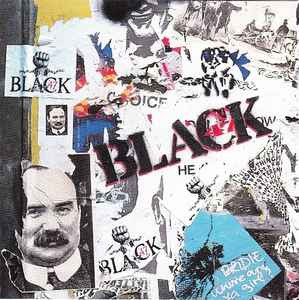 for every album: Geoffrey Blythe on tenor, soprano and baritone saxophones; Chris Byrne playing the uilleann pipes, tin whistle, bodhran, and occasionally doing vocals; Thomas Hamlin on drums and other percussion; Larry Kirwan, leader of the band, lead vocals and guitar — with a foray once in a while into playing synthesizer or doing some percussion; and Fred Parcells on trombone and tin whistle. David Conrad plays bass on this album, but would last only one more album before leaving the band.
for every album: Geoffrey Blythe on tenor, soprano and baritone saxophones; Chris Byrne playing the uilleann pipes, tin whistle, bodhran, and occasionally doing vocals; Thomas Hamlin on drums and other percussion; Larry Kirwan, leader of the band, lead vocals and guitar — with a foray once in a while into playing synthesizer or doing some percussion; and Fred Parcells on trombone and tin whistle. David Conrad plays bass on this album, but would last only one more album before leaving the band.
The sound of Black 47 remained the same over the past decade: lead vocals usually by Kirwan, but Chris Byrne would do a song now and then, with a swirling backbeat of drums, saxes, guitars, and uilleann pipes. Occasionally a tin whistle or bodhran would be added to the mix, but essentially the sound is straight forward folk rock. (The closet comparison would be the short-lived Irish group Moving Hearts, which were fronted by Donal Lunny and Christy Moore with an instrumental mulligan stew of drums, saxes, guitars, and uilleann pipes.) This is not the music of your da’ — this is music aimed at the the generation of Irish-Americans who grew up in the late ’50s and ’60s. (An early in joke is that they won’t ever play “Danny Boy” — but they do on Home of the Brave. It’s a wonderful goof on the Danny Boy generation.) The difference between Moving Hearts and Black 47 is simple — the former were a traditional group that rocked out, but Black 47 is a rock band that uses trad themes and instruments to escape being just another bloody rock band.
We fought them to a standstill while the flames lit up the sky
‘Til a bullet pierced our leader and we gave up the fight
They shot him in Kilmainham jail but they’ll never stop his cry
My name is James Connolly, I didn’t come here to die….”“James Connolly”
The lyrics inserted above depict the explicit themes of Black 47 — the political nature of history on one hand (“James Connolly”) and the political 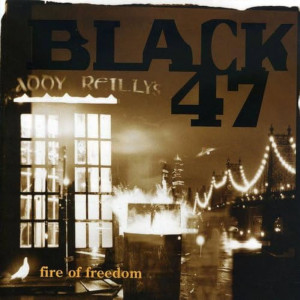 being made personal on the other hand (“Banks of the Hudson”). It helps to keep in mind that Kirwan is a playwright, so this is music as theater. When they hold the the Starry Plough flag on high, they are using it as a prop to dramatize the lyrics in “James Connolly” that say, “Marchin’ down O’Connell Street with the Starry Plough on high / There goes the Citizen Army with their fists raised in the sky.” (In 1913 police attacked striking workers who were demonstrating in Dublin, killing two. Trade union leaders decided to establish a paramilitary organisation called the Irish Citizen Army to protect the workers. Although the ICA was originally armed only with batons it soon acquired firearms and explosives. The Starry Plough was adopted as the army’s flag in 1914: the plough and the stars symbolising the present and the future of the working class respectively. The ICA participated in the 1916 rising at which time the British army captured their flag. It was returned to Ireland in 1966 and is now preserved in the National Museum of Ireland.) The audiance has its emotions raised high by both the words and the images that Larry crafts — this is political music at its very finest.
being made personal on the other hand (“Banks of the Hudson”). It helps to keep in mind that Kirwan is a playwright, so this is music as theater. When they hold the the Starry Plough flag on high, they are using it as a prop to dramatize the lyrics in “James Connolly” that say, “Marchin’ down O’Connell Street with the Starry Plough on high / There goes the Citizen Army with their fists raised in the sky.” (In 1913 police attacked striking workers who were demonstrating in Dublin, killing two. Trade union leaders decided to establish a paramilitary organisation called the Irish Citizen Army to protect the workers. Although the ICA was originally armed only with batons it soon acquired firearms and explosives. The Starry Plough was adopted as the army’s flag in 1914: the plough and the stars symbolising the present and the future of the working class respectively. The ICA participated in the 1916 rising at which time the British army captured their flag. It was returned to Ireland in 1966 and is now preserved in the National Museum of Ireland.) The audiance has its emotions raised high by both the words and the images that Larry crafts — this is political music at its very finest.
But Black 47 — and particularly Larry — are at their histrionic best when dealing with history that affects the personal lives of contemporary folk. Larry is addressing racism in the Irish-American community — something rarely dealt with. But Larry clearly likes this theme as “40 Shades of Blues” with its lyrics “Ah you’ve got a great future behind you / But you’re goin’ nowhere fast / Just up and down the Bowery from Canal Street to old St. Marks /And you wonder what she’s up to now / Did she really find somebody new / Ah how the hell could she just walk out like that / On your 40 shades of blue” and ” Funky Ceili (Bridie’s Song)” with its refrain “Bridie broke down and started to bawl / So we drove the Morris Minor to Cork / The ould fella said ‘you’ve got two choices, Castration or a one way ticket to New York!'” Castration? Bloody unlikely — More likely he would been told to marry here now. But this unlikely ultimatum allowed the narrator to escape married life by going to New York City where he’s now: “So here I am up on Bainbridge Avenue / Still in one piece but glad I’m alive / Drinkin’ dirty big glasses of porter / Playin’ me jigs and me reels and me slides / Think of you, Bridie, whenever I’m sober / Which isn’t too often, I 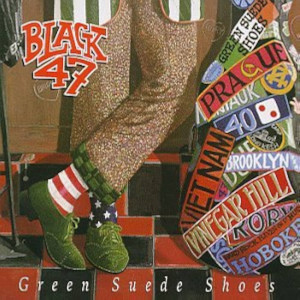 have to confess.” Perfect life for a musician, eh? (Only if you’re single which blessed be I’m not. I like our goose down comforter covered bed with me wife beside me on a cold winter’s night.)
have to confess.” Perfect life for a musician, eh? (Only if you’re single which blessed be I’m not. I like our goose down comforter covered bed with me wife beside me on a cold winter’s night.)
Other themes covered in their first album included how the band came to be (“Now everywhere we go we cause a fuss / ‘Cause we play what we like and our sound is us / It’s got a whole lot of hell and a little bit of heaven / That’s the story so far of Black 47” — from “Rockin’ the Bronx), political prisoners (a matter they will revisit often), being cold and homeless in New York City, and returning to NYC after going back to Ireland. It should be noted that New York City is the main stage upon which the band struts its stuff. The band is that rare entity that is firmly grounded in a place. Without NYC, Black 47 would not exist. And without the theatrical interpretation of the Irish-American experience by Larry the band would not be nearly as entertaining as it is.
The Black ’47 EP that follows has only one song that’s not on their debut album, but it’s a great song: “Our Lady of The Bronx,” a scree on the meaning of prayer when you’re in the tight downward spiral into your own personal hell. (No, I have no idea why they released an EP that was mostly a subset of their first album.)
EMI released Fire of Freedom, their third album. Not surprisingly, there was only one new cut were on it (“New York, NY 10009” ) as it was basically a re-release of their self-released debut. If I read “New York, NY 10009” right, it’s the first of several songs in which the band expresses its strong displeasure at Rudi and company: “Oh Sheila, baby, give me one more chance / I’ve just gone and started Black 47 / I don’t care about the money, you can keep the fame I just want to beat this city at its own dumb game.” And even later on they will express their anger at the whole music scene…
Home of the Brave was released by EMI too. Everything on it was — surprise! — new. Same themes though — love, politics, strong drink, greedy 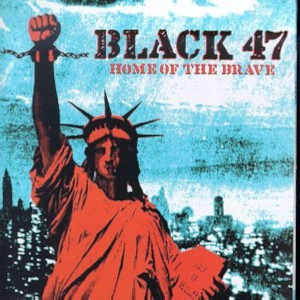 politicians, and the agony of being Irish-American. “Big Fellah” revisits the Easter Uprising with its pithy lyrics: I remember you back in the GPO with Connolly and Clarke / Laughin’ with McDermott through the bullets and the sparks / Always with the smart remark, your eyes blazin’ and blue / But when we needed confidence we always turned to you / And when they shot our leaders up against Kilmainham wall / You were there beside us in that awful Easter dawn.” And the band discovers the rights of groups other than the Irish under the English yoke: “Paul Robeson (Born To Be Free)” and “Black Rose” take slightly different approaches to being Black. Now “Different Drummer” is anything but political, but rather a possibly autobiographical romp through the life of a musician.
politicians, and the agony of being Irish-American. “Big Fellah” revisits the Easter Uprising with its pithy lyrics: I remember you back in the GPO with Connolly and Clarke / Laughin’ with McDermott through the bullets and the sparks / Always with the smart remark, your eyes blazin’ and blue / But when we needed confidence we always turned to you / And when they shot our leaders up against Kilmainham wall / You were there beside us in that awful Easter dawn.” And the band discovers the rights of groups other than the Irish under the English yoke: “Paul Robeson (Born To Be Free)” and “Black Rose” take slightly different approaches to being Black. Now “Different Drummer” is anything but political, but rather a possibly autobiographical romp through the life of a musician.
Black 47 bills itself as one of the hardest working bands in the business. It’s certainly one of the few bands ever signed to a major label that continued to do a weekly pub gig, as they have for ten years now. This song hints strongly that they have never forgotten they are a pub band that briefly — all too briefly — was famous enough to be written up in Time and a myriad of other publications. But the fall is already being depicted in the song “Time To Go”: … anyone upsets the status quo / You’re stabbed in the back by the so-called liberal whores / I know this much, this much I know people are dying—it’s time to go. It’s time to go. They certainly were feeling angry on this album!
Mercury Records had the honor of releasing Green Suede Shoes, which 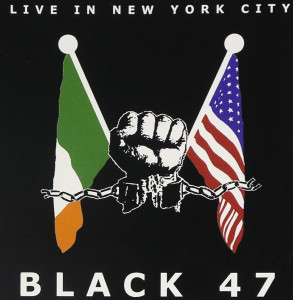 naturally continues the themes developed thus far. My favorite cut is “Sam Hall,” a very obvious updating of “Jack Hall,” a song made famous by Steeleye Span. (Was it a deliberate irony on the part of Larry to take an English song and give it a very bitter Irish slant?) Sam Hall, the anti-hero of this song opines bitterly: “Oh me name it is Sam Hall – chimney sweep chimney sweep / Oh me name it is Sam Hall – chimney sweep / Oh me name it is Sam Hall and I hate you one and all / And me neck must pay for all ‘ere I die.”
naturally continues the themes developed thus far. My favorite cut is “Sam Hall,” a very obvious updating of “Jack Hall,” a song made famous by Steeleye Span. (Was it a deliberate irony on the part of Larry to take an English song and give it a very bitter Irish slant?) Sam Hall, the anti-hero of this song opines bitterly: “Oh me name it is Sam Hall – chimney sweep chimney sweep / Oh me name it is Sam Hall – chimney sweep / Oh me name it is Sam Hall and I hate you one and all / And me neck must pay for all ‘ere I die.”
There’s other great material here, mostly notably the songs “Green Suede Shoes” and “Walk All Days.” “Green Suede Shoes” continues their earlier theme of what happens after you’re famous. On the other hand, “Walk All Days” features the rarely heard vocal talent of the piper Chris Byrne and deals with the death of a cop at the hands of a shooter.
The contract with Mercury lasted just one album. Their latest album as I write this is Live in New York City which was released Gadfly Records. Live In New York City captures the group at its St. Patrick’s Day 1998 show at the Wetlands in Manhattan. It features many of the group’s most requested songs, plus a medley of reels as well as covers of Bob Marley’s “Three Little Birds” and Dylan’s “Like A Rolling Stone.” Kirwan notes on the Gadfly Records Web site that “In nine sweaty, boozy uproarious, political & controversial years Black 47 has played well over 1500 gigs. Despite shootings, van crashes, blacklisting and an incredibly stupid and shortsighted music industry, we never gave less than 110%. This CD 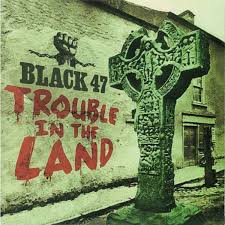 captures one of those nights.” This is a great album — the crowd sounds are particularly great!
captures one of those nights.” This is a great album — the crowd sounds are particularly great!
Black 47’s Trouble in the Land, an album that is more rock ‘n’ reel than it is traditional. It reflects the fact that Kirwan is first and foremost a playwright — these are really little pieces of theatre set within a musical framework. This is the last recording with piper Chris Bryne as he has the group after ten years to form another group, Seanchai and The Unity Squad, a Celtic hip hop group. But no matter how much or how little the band may change with the departure of founding member Chris Bryne, Black 47 is the quintessential Irish-American rock ‘n’ reel band as it merges traditional material with the political and cultural consciousness of the newer Irish immigrants. All the usual themes are here — political angst, love, racism, violence, and redemption.
(BLK Records, 1991)
(BLK Records, 1991)
(EMI, 1993)
(Mercury, 1996)
(EMI, 1994)
(Gadfly, 1999)
(Shanachie, 2000)
